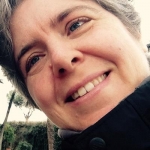‘Here, we are alive. There, we were no longer men’
In May, AFP's deputy bureau chief in Rome Fanny Carrier spent a week aboard the Aquarius, one of a small armada of ships that are rescuing migrants all along the Libyan coast. This is the second of a three-part series on the voyage.
Aboard the Aquarius in the Mediterranean -- The next morning, I wake up shortly after sunrise. We have arrived at our destination, about 20 nautical miles off the Libyan coast. The ship has stopped. We wait.
The weather is just right for the migrant boats -- it’s clear, there is a slight southern breeze and the sea is calm. Shortly after 7:30 am, I am on the bridge with Captain Alex. In the distance, we can just make out the Libyan coast. But all is calm for the moment. Noone is calling for help, the radios are silent. Normally at this hour, they are alive with the various distress signals. Then at 7:53 the coast guard signals a dinghy, whose whereabouts are not yet precise. At 8:13 the Germans on SeaWatch say they have spotted it. They say they will distribute life jackets to those on board and wait for the Aquarius to come and get them. At 8:18 the Italian coast guards launch a general alert, signalling numerous boats in distress. “We will be full today,” remarks Captain Alex.
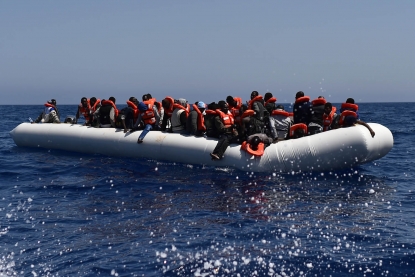 (AFP / Gabriel Bouys)
(AFP / Gabriel Bouys)At 8:23 the machine room gives it go-ahead and the Aquarius picks up speed. The captain adjusts the radio to the frequency used by SeaWatch so that we can hear the conversation between it and the rubber boat distributing the life jackets. “We are going to need more children’s life jackets,” the radio crackles. Hearing this, Captain Alex announces on the Aquarius’s internal system: “Message to MSF. There are children on board.”
A few flights of stairs below, Angelina, the Italian midwife, and Mary Jo, the American nurse from California, get their children’s supplies in order -- clothes, baby milk formula, diapers. On the bridge, Ebenezer Tandot, and Francis Mensah, put air into their anti-cold jumpsuits. The two Ghanaian sailors will be piloting the rubber boats that will go toward the dinghy. They have worked together for a long time, including on oil platforms in the North Sea, where hypothermia sets in and can kill after eight minutes in the water, so they take precautionary steps very seriously.
A little after 10:00 a tiny white line appears against the background of the blue sea -- the migrant dinghy.
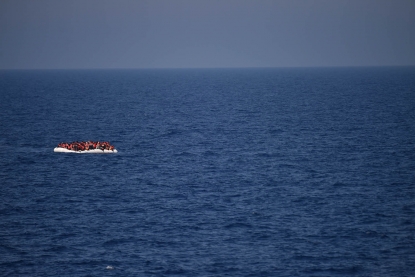 (AFP / Gabriel Bouys)
(AFP / Gabriel Bouys)The first of Aquarius’s two rubber boats leaves towards it. Already, a SeaWatch boat is speeding toward us with a two-year-old boy from Cameroon suffering from dehydration and pneumonia. I observe as Aquarius’s second rubber boat is prepared to be lowered into the sea. I see Giovanni, my videographer colleague, take a seat on it, and I go to see what’s happening with the little boy.
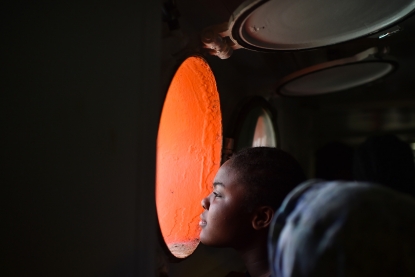 (AFP / Gabriel Bouys)
(AFP / Gabriel Bouys)Angelina is no longer smiling. She needs help and yells to me to go get Mary Joe. When I get back on deck, I find it in crisis mode -- the rubber boat that just went into the water has tipped over, sending its four passengers into the water. Luckily they have been plucked out and are safe. Fabrice, one of the rescuers, gets back on board, cursing. Then I see Giovanni reappear, soaked and shaken -- he’s lost his camera. He’ll finish the trip recording video on his IPhone 6 that he had the sense to slip into my pocket before getting into the rubber boat.
There is no time to find out exactly what happened -- Aquarius’s other rubber boat has come back with more than a dozen children less than five years old on board. Some are just a few months old. Many are crying. Their mothers arrive on the next run. Fabrice and Antoine, another soaked rescuer, help them to take off their life jackets and take them to a room below. They are all barefoot, freezing and exhausted. One woman waves to everyone, happy and relaxed. At her side, another cries in silence.
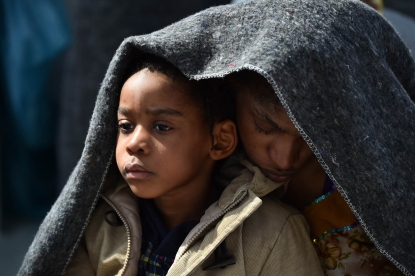 (AFP / Gabriel Bouys)
(AFP / Gabriel Bouys)After the mothers, the boats finally bring the men, also cold and tired, who have to remain on deck for the rest of the trip. MSF personnel distribute emergency kits -- a blanket, a thin white jumpsuit, a warm pair of socks, a towel and a bottle of water. With the last of the migrants getting on board at 11:36, the Aquarius returns the life jackets to SeaWatch and leaves, leaving the Germans to sink the dinghy.
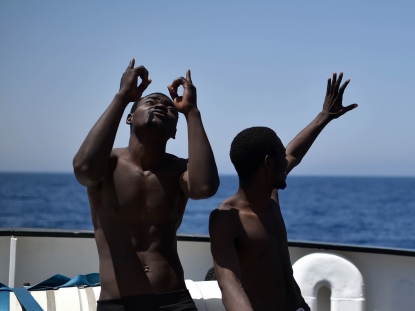 (AFP / Gabriel Bouys)
(AFP / Gabriel Bouys)On deck, Franck Kameni, a 29-year-old man from Cameroon, hugs Josue, his 11-month-old son. He tells of the few months that they spent in Libya, between kidnappings, beatings and ransom payments. “Here we are alive,” he says. “There, we were no longer men.”
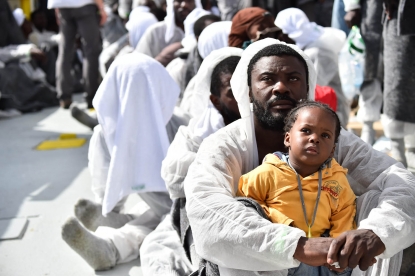 (AFP / Gabriel Bouys)
(AFP / Gabriel Bouys)Our conversation is interrupted by a Italian navy helicopter, which comes to evacuate the little Cameroonian boy who was brought on board first and who is now in critical condition. I follow the SOS Mediterranee crew who are going to help with the evacuation from the roof of the bridge, where the helicopter has deposited a doctor and two others with a stretcher. It’s moving to see so much material and so many people mobilized to save the life of a small boy who was considered less than nothing when he was in Libya, just a few hours ago.
The helicopter comes back a few minutes later to pick up the doctor and the toddler, who is lying attached to the stretcher, now in a coma, wrapped in an emergency blanket.
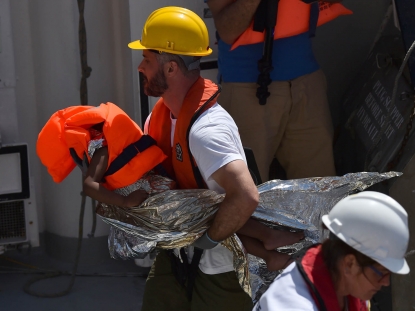 (AFP / Gabriel Bouys)
(AFP / Gabriel Bouys)The stretcher is attached to a line that the helicopter crew begins to pull up. It tangles precariously to and fro in the breeze and the child slides. But he doesn’t fall. The Italians haul him up and take off for Cavour, an aircraft carrier that’s Operation Sophia’s main ship. The helicopter will come back for the rest of its crew and the boy’s mother after dropping the child off. For the first time since we set off, I feel sea sickness coming on.
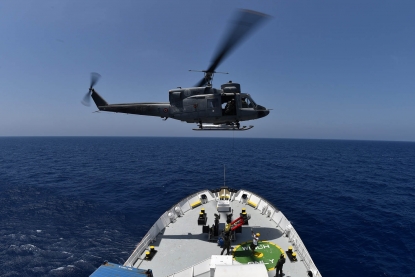 (AFP / Gabriel Bouys)
(AFP / Gabriel Bouys)Meanwhile the Aquarius is on its way to pick up around 250 migrants who have been saved from their dinghy by a tug boat. The ones that we have already picked up are exhausted and are lying anywhere they can find a spot on deck. We have two hours of sailing ahead of us, so I return to my cabin to try and write my story for the day. Not a good idea -- the nausea quickly becomes unbearable. I move with my computer to higher ground, where there is fresh air.
Around 16:00, the tugboat is at our side, its deck filled with migrants. Much smaller than Aquarius, it rolls on the waves, which are now some 1.5 meters. We veer to the side for a better approach and I find myself in the sun, with my computer on my knees, overcome by seasickness looking at a boat bobbing up and down on the waves, its deck overflowing with humanity. I wonder how rescue teams feel when they find themselves in front of boats even smaller than this, filled with hundreds of people who can drown at any moment.
Because of the heaving waves, the transfer of the migrants to the Aquarius takes hours. There is a procession of exhausted silhouettes on deck. Below, I can hear Mary Jo trying to bring order to the room with the women and children. Meanwhile the smell of lasagna that Rabbi the chef is preparing for the Aquarius’s crew wafts through the air. I write my story while at the same time observing what’s going on from the bridge.
 (AFP / Gabriel Bouys)
(AFP / Gabriel Bouys)Captain Alex meanwhile is aggravated and annoyed. The transfer is taking too long and he still can’t get over the fact that one of the boats overturned. One of his best friends died that way -- there was an accident and the boat they were in overturned in cold waters and his friend was the last one to be pulled out of the water, already dead from hypothermia.
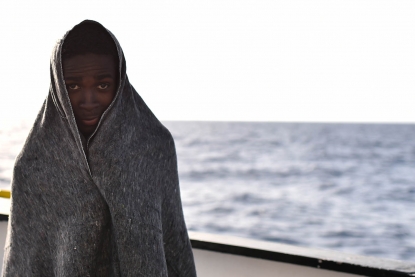 (AFP / Gabriel Bouys)
(AFP / Gabriel Bouys)The migrants are finally all on board around 1930. “Thank you and goodbye,” Captain Alex says to the captain of the tug boat over the radio. “I hope we’ll meet another time in different circumstances.”
“I hope not,” comes the reply from the tug boat, where the crew is throwing whatever the migrants left behind overboard and cleaning the deck with hoses.
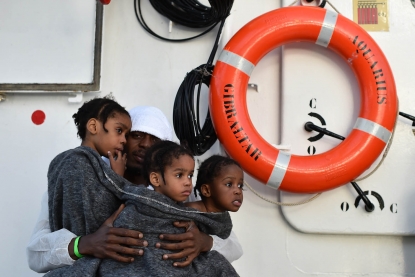 (AFP / Gabriel Bouys)
(AFP / Gabriel Bouys)Captain Alex and Jens, the head of the MSF crew on board, compare notes -- Aquarius has taken on 385 passengers, including 26 children less than five years of age and 105 women. Nearly all of Africa is represented -- 123 from Cameroon, 61 from Ivory Coast, 44 from The Gambia, 40 from Guinea, 23 from Eritrea, 13 from Somalia, 13 from Senegal, 11 from South Sudan, nine from Mali, eight from Nigeria, seven from Sudan and a few people from Ghana, Guinea Bissau, Sierra Leone and Bangladesh.
They all boarded three rubber dinghies at night from the Libyan coast. And they weren’t the only ones -- in total, more than 3,000 people on board 23 vessels were rescued during the day. But the rescue coordinators don’t want to let all the rescue boats go to Italy to drop off the migrants because the weather forecast for tomorrow is the same as today, which means there’ll be as many dinghies in the waters again and they need the rescue boats here. Captain Alex has to insist that the Aquarius -- which is more than 100 people above the 250 passengers it’s meant to accommodate -- be allowed to leave. We’re a rescue boat, saving migrants from overfilled vessels and we’re overfilled ourselves.
We finally get the authorization to leave and then we get the bad news from the Italian interior ministry -- the Aquarius is to proceed to Cagliari, in Sardinia. All the closer ports are already at their limit. For the migrants onboard, that will mean two more days at sea.
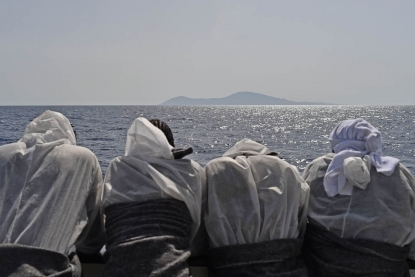 (AFP / Gabriel Bouys)
(AFP / Gabriel Bouys)The instructions are not to tell them too much in order not to get their spirits down. For now, they are all simply exhausted. After receiving energy bars (dinner), they each look for a place on deck where they can curl up under their blanket. One man paces back and forth on deck -- his wife left at the same time, but in another dinghy. She was probably picked up by another rescue boat and is likely making her way towards Italy as well. But it’ll take him time to find her again.
I can’t fall asleep for hours. I stare at the sea outside my cabin window. I feel ashamed to have the right to eat Rabbi’s lasagna and to have this small room all to myself, with its bed and private bathroom, while 385 men, women and children are curled up on the floor and have to share four toilets between them. But my privilege extends further. In my pocket, I have a cell phone with which I can call my family whenever I want. And tucked away in Captain Alex’s cabin, a European passport that allows me to travel freely nearly all over the planet….
(To be continued….)
This blog was translated from the French by Yana Dlugy. Read the original here. Read Part 1 of the series here.
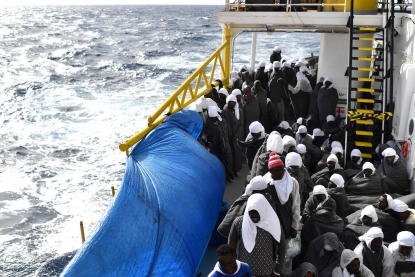 (AFP / Gabriel Bouys)
(AFP / Gabriel Bouys)


